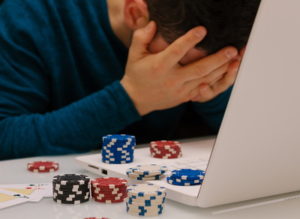 If there is one saying about gambling that virtually everyone knows it is that the House always wins. A slightly less well-known, but still appropriate, saying is that you ‘never see a poor bookmaker’. That might not actually be true, with plenty of bookies going out of business over the years, but it is the sort of thing that many people believe is true because it fits into the narrative that the only people that lose when placing bets are the punters themselves, with the businesses that take the bets making more than enough money to keep them happy in the long-term.
If there is one saying about gambling that virtually everyone knows it is that the House always wins. A slightly less well-known, but still appropriate, saying is that you ‘never see a poor bookmaker’. That might not actually be true, with plenty of bookies going out of business over the years, but it is the sort of thing that many people believe is true because it fits into the narrative that the only people that lose when placing bets are the punters themselves, with the businesses that take the bets making more than enough money to keep them happy in the long-term.
Despite the fact that we all know that we’re almost certainly going to lose, billions of people around the world gamble on a regular basis. Why on earth are people so happy to put their money at risk if they know that they’re far more likely to lose it than they are to end up with any sort of return on what they’re betting?
What some people might struggle to understand is that there are those that see gambling as nothing more than another form of entertainment, only risking what they can afford to lose and seeing it as a fair exchange for the entertainment they receive.
Gambling Is A Form Of Entertainment to Some
 There is no question that, to some people, gambling is just another form of entertainment that sits alongside the likes of going to the cinema or heading out for drinks with friends. Whether they go to a dog racing track, spend a day at a racecourse or choose to turn up at their local casino, these people enjoy the time that they spend gambling.
There is no question that, to some people, gambling is just another form of entertainment that sits alongside the likes of going to the cinema or heading out for drinks with friends. Whether they go to a dog racing track, spend a day at a racecourse or choose to turn up at their local casino, these people enjoy the time that they spend gambling.
To those that see gambling as a form of entertainment, the amount that they gamble with is the equivalent to the budget that others would set aside for tickets to the theatre or what they spend on a really nice dinner. These people tend to be disciplined, putting themselves in a situation where they have a specific bankroll to bet with.
Rather than heading out without any sense of what the day or night is going to cost them, heading to a cash point every time they lose money, the ‘gambling as entertainment’ crew will have a set amount of money that they know will be at risk and are willing to lose it all in exchange for the ‘fun’ that they think they’re going to have.
If they lose every penny then they won’t be too upset because they will feel that they’ve essentially ‘spent’ it on what they’ve done with their time, rather than ‘lost’ it. They will have lost it, of course, but the mindset that they have is that it is the fee that they’ve paid for their enjoyment.
When 5,500 punters were interviewed about why they bet, the strongest factor was the chance that they might ‘win big money’. After that, though, came the answers that ‘it’s fun’ and ‘it’s exciting’, showing that it isn’t just about trying to win, even if that is one of the biggest factors.
Mark Griffiths, who is a Psychologist at Nottingham Trent University, said, “Even when you’re losing while you’re gambling, your body is still producing adrenalin and endorphins. People are buying entertainment.” That obviously fits in with what we’re saying here, that it is about the ‘entertainment’.
Some People Think They Can Win
 It is certainly the case that some people will run the risk of losing their money in the hope that they might win. They look at the likes of the odds of the National Lottery and don’t think about how tiny their chances of winning are, but rather they concentrate on the fact that others have won in the past.
It is certainly the case that some people will run the risk of losing their money in the hope that they might win. They look at the likes of the odds of the National Lottery and don’t think about how tiny their chances of winning are, but rather they concentrate on the fact that others have won in the past.
Rather than consider the idea that lottery winners aren’t real and it’s just a ruse with actors to get people to play, they think that they could be the next big winner because someone will win at some point so why can’t it be them? This sort of thinking is why they gamble in spite of knowing they’ll almost certainly lose what they stake.
When people head to Las Vegas, the majority of the time they don’t think that they’ll actually end up winning large sums. Instead, they go for the pleasure of the experience with the chance that the might win something at the back of their mind.
It is a delicate balance between wanting to win and knowing that they probably won’t, meaning that they just try to enjoy the experience. For such people the possibility of winning is what drives them to gamble rather than any sort of belief that they will definitely win. How that balance plays out is different for different people, of course.
There Are Those That Know They’ll Lose But Bet Anyway
 It is important to acknowledge that there are plenty of people who know that they are almost certainly going to lose their money and yet choose to bet anyway. There are very few people in the world that don’t realise that the House is always going to win, but that doesn’t stop them from placing wager after wager in the hope that they’ll be able to be the exception that proves the rule.
It is important to acknowledge that there are plenty of people who know that they are almost certainly going to lose their money and yet choose to bet anyway. There are very few people in the world that don’t realise that the House is always going to win, but that doesn’t stop them from placing wager after wager in the hope that they’ll be able to be the exception that proves the rule.
The reality is that they won’t be, statistically speaking. The number of people that win enough to make it worth gambling in the first place is tiny, whilst those that win small amounts often re-invest it and lose it eventually anyway.
There are people that do not bet sensibly. Rather than setting themselves a limit of what they can afford to lose, not gambling any more than that, these people will spend good money chasing the bad that they’ve already lost.
It is key to realise that this is not a healthy relationship with gambling and such people tend to be in the minority when compared to those that approach gambling in a much more healthy manner. Yet it is these people that anti-gambling campaigners will often focus on, believing that they’re more representative of the overall nature of punters than they actually are.
Psychological Factors Play A Part
 Whilst we can point to all sorts of reasons why people choose to gamble in spite of knowing that they’re likely to lose their money, the truth is that we shouldn’t ignore the psychological factors that definitely play a part.
Whilst we can point to all sorts of reasons why people choose to gamble in spite of knowing that they’re likely to lose their money, the truth is that we shouldn’t ignore the psychological factors that definitely play a part.
Whether you win or lose your bet, it is likely that the decision to even place a wager in the first place will have had an impact on your brain. The University of British Columbia’s Department of Psychology’s Assistant Professor, Catherine Winstanley, said, “For most individuals, gambling is enjoyable and harmless, but for others, it is as destructive as being addicted to drugs.”
A study by Kyle Siler, who was a Sociology doctoral student at Cornell University, was published in the Journal of Gambling Studies. In it, Siler was able to show that the more hands of poker someone played, the higher the chances were that they would leave the game with smaller profits. He said, “They might win a lot of small battles, but they’re losing the war.”
Near losses often encourage people to place another bet to try to win it all back, with the same parts of the brain being triggered as when they win. This encourages many to keep betting, even whilst knowing that they’re losing.
There is also the fact that a gambler’s expectations around winning changes the longer a losing streak goes on. One of the Neuroscientists at University College, London, Robb Rutledge, performed experiments with 26 subjects. It involved looking at their brains whilst they made a series of selections that would result in either a certain outcome or an uncertain one. They were asked to rate their sense of happiness every few goes, which discovered that people who had low expectations of a win displayed an increased sense of happiness when they won a small amount.
Rutledge said, “If people lose a bunch and that lowers their expectations, that will increase how happy they are when they finally do win. If a couple of bad things in a row happen to you and your expectations go down, but then you actually get some good outcomes, you’ll probably be happier.”
Whilst he says that you should probably walk away at that point, most people don’t. Add into that the fact that games are actually set up to offer lots of little ‘rewards’, even though some aren’t financial gains, and you can suddenly understand why it is that people continue to place bets despite losing.
